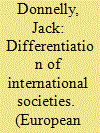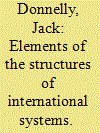| Srl | Item |
| 1 |
ID:
110831


|
|
|
|
|
| Publication |
2012.
|
| Summary/Abstract |
Taking off from a recent article in this journal by Barry Buzan and Mathias Albert, I present a framework of structural differentiation as an alternative to IR's standard tripartite conception of the elements of structure. Rather than employ ideal type models, though, as Buzan and Albert do, I present a more open-textured, multidimensional account of differentiation. I also emphasize the systemic nature of structural analysis. The elements of structure are interdependent parts of wholes (systems) - not the independent variables implied by standard formulations such as 'the effects of anarchy'. A multidimensional systemic approach directs our attention to the diversity of and change in international systems and their structures, which mainstream structural IR typically ignores or obscures. I illustrate both the regularity of extensive structural change and the analytical utility of my differentiation framework with case studies of post-World War II international society and contemporary processes of globalization.
|
|
|
|
|
|
|
|
|
|
|
|
|
|
|
|
| 2 |
ID:
115313


|
|
|
| 3 |
ID:
071774


|
|
|
|
|
| Publication |
2006.
|
| Summary/Abstract |
How is unrivalled American power reshaping 21st-century international society? Is the United States an empire, in fact or in the making? This article attempts to elaborate the conceptual resources required to answer such questions. I focus on multiple forms of hierarchy in anarchy and diverse practices of sovereign inequality-concepts that most mainstream perspectives ignore, find paradoxical, or even dismiss as self-contradictory. After defining empire and hierarchy in anarchy, I present a typology of international orders tuned to thinking about empire and its alternatives. The central section of the article explores three classes of formal inequalities common during the Westphalian era-special rights of Great Powers, restricted rights for outlaws, and a wide range of particular practices of 'semi-sovereignty'. I then sketch ten historically grounded models of hierarchical international relations. Two brief applications to contemporary American power seek to illustrate the value of this conceptual apparatus. Throughout, my focus is on appreciating the precise nature and considerable variety of international inequalities. I argue that the concepts of hierarchy in anarchy and sovereign inequality, but not empire, are essential for understanding the shape and development of contemporary international order.
|
|
|
|
|
|
|
|
|
|
|
|
|
|
|
|